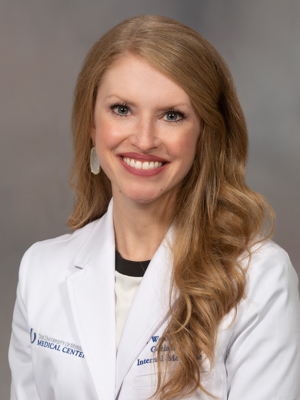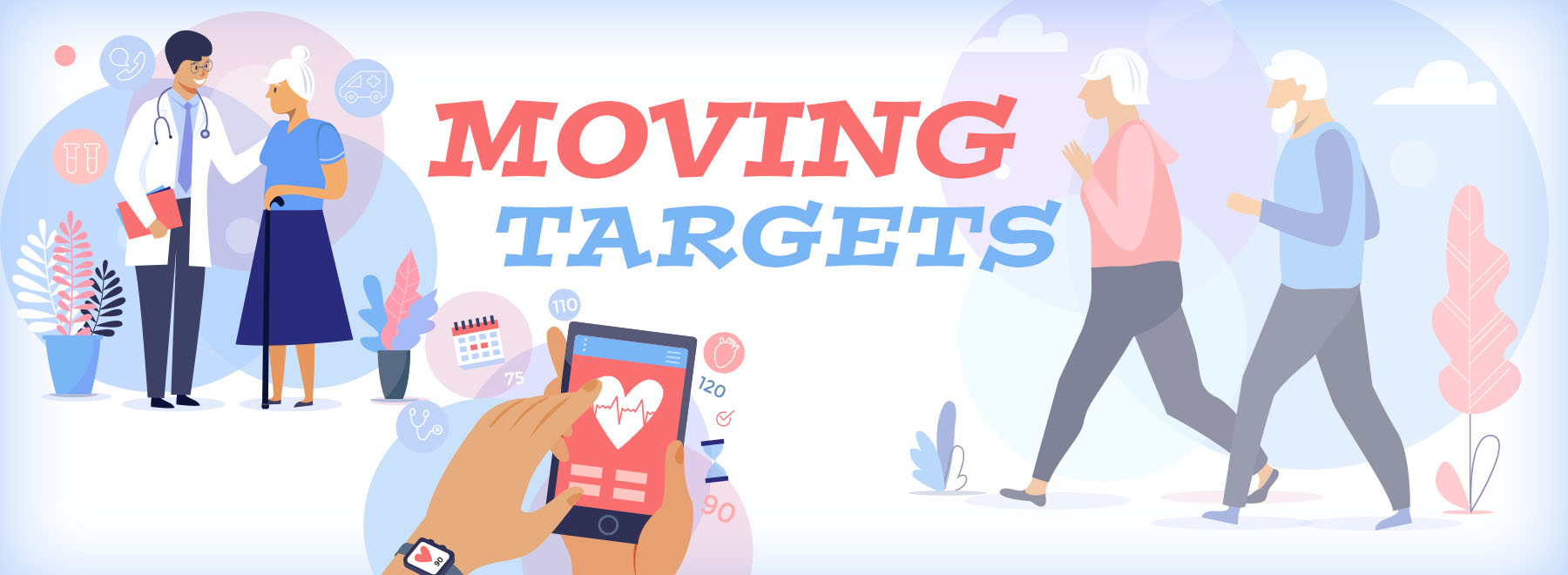Wrong number? Medical test norms not always age-appropriate
While medical test numbers amount to a verdict on a patient’s state of health, many older adults age out of guidelines for blood pressure, blood sugar and more.
At the University of Mississippi Medical Center, two physicians put their fingers on exceptions to some physiological rules of thumb.

“Our public health entities have done a great job educating the public about the need for prevention,” said Dr. Sonya Shipley, UMMC associate professor of family medicine, who is board-certified in geriatric medicine. “But no one really talks about the exceptions or caveats to the rules.”
As a person ages, “it’s really more about balancing risks,” said Dr. Lyssa Weatherly, UMMC assistant professor of medicine and an internal medicine specialist who is also a board-certified geriatrician.
In general, an “older adult” in the clinic is at least 65 years old, but to be a candidate for geriatric medical care, other conditions – or their absence – should be considered, such as frailty.
“Age 75 looks very different on different people,” Shipley said.
Take blood pressure. The American Heart Association’s latest recommendations say a patient with a reading of 130/80 or more should be treated for high blood pressure.
“If you are very healthy and can tolerate a low blood pressure, certainly you should,” Shipley said. But for frail patients with one or more chronic diseases and conditions, “we are actually doing more harm than good in keeping that blood pressure in the lower range,” she said.
“For some people, their blood pressure is naturally low; it may have been 100 all their lives. But if my frail patients are at 140 or 150 and we struggle to get their blood pressure down to 100, they may stroke out on me.”

For Weatherly, the “healthy and active” patient does well to shoot for 120/80.
“But if the patient is troubled by falls or lack of balance, below 150/90 is more realistic,” she said. “In that case, when it’s in the 140s, I’m also happy with that.”
Below is more age-adjusted advice.
Glucose (Diabetes Risk)
“Hypoglycemia (low blood sugar) can cause issues as you age,” Weatherly said.
Sometimes, for frail, older adults, a very low glucose level is more harmful than a high one, she said.
For the normal, non-diabetic patient, the recommendation for the glucose, or HbA1C, score is under 5.7, she said. For someone with diabetes, it’s less than 7.
“But for overall healthy older patients, the goal is 7.5, particularly if they are good about taking their medications correctly.”
When it comes to frail, older patients, or those with an end-stage disease such as advanced dementia, severe kidney failure or heart failure, she has an easy-to-remember target.
“Your age should correspond to the A1C score,” she said. “For a frail 85-year-old, the average would be 8.5, or 8.0 to 9.0.
“For someone who is 90, it should be around 9.0. However, I might have a very vital and healthy 90-year-old shoot for a lower target. It’s all about shared decision-making and the weighing of risks versus benefits for the individual patient."
Cholesterol
Weatherly does not usually ask her older patients to strive for certain low-density lipoprotein levels, but high LDL is linked to “cardiovascular disease risk.”
“There is a risk calculator which figures in cholesterol numbers, but not those alone,” she said. “If the risk is high, even at a young age, therapy is called for.”
Even so, she said, the calculator’s risk score “is proven to have benefits only for people up to age 79.”
As for statins – drugs that help reduce levels of fat – she doesn’t propose starting them for people 75 or older, “if they haven’t had a stroke or heart attack.”
For someone who has been on statins for years, primarily for prevention, “we will recommend stopping statins after age 75, minus risk of a heart attack, but it’s up to the patient.”
As Shipley said, “We try to personalize our approach. We look at the patient’s family history, and of course, the patient’s own history. Then we try to have some shared decision-making.”
BMI
The Body Mass Index, a health-risk screening tool for body fat amounts, indicates a healthy weight score of 25 or less, while under 18.5 is considered underweight.
“For older adults, the ideal BMI may actually be a little bit higher than 25,” Shipley said. “The 25-to-29 range has been shown to be associated with lower mortality risk for folks who are 70 or older.
“We still advocate for healthy diet and exercise.”
In fact, physical activity and weight loss are measures that can help control such disorders as diabetes and high blood pressure, she said.
“If you happen to lose weight because of exercise and diet, that’s OK, because you’re building muscle as you lose weight. But we don’t want people to lose weight if it causes them to lose muscle, because they get weak and fall and run other risks.
“We worry when losing weight is unintentional.”
Aspirin
“For people who have never had a stroke or heart attack, it’s for prevention,” Weatherly said. “Otherwise, as you age, it’s not as beneficial.”
She suggests stopping regular doses of aspirin after age 70, minus those risks. If patients are older than 75 and already taking aspirin, she lets them decide whether to stop the doses if they have never had a heart attack or stroke.
Otherwise, keeping them on – or stopping – aspirin is also dictated by their risk of bleeding, she said.
Alcohol
“As we age, in general, organ function begins to decline,” Shipley said. “Because of those changes in our organs and metabolism, alcohol is not processed as readily as it was when we were younger.
“Moderate drinking for a person 65 or older is one drink a day or less.“
Mammograms
The U.S. Preventive Services Task Force finds no reason to recommend breast cancer screening after age 75.
“However, if you are a very healthy 75-year-old, a mammogram may benefit you,” Shipley said.
That is, for anyone at that age with a life expectancy of another 10 years or more.
“As with so many other things,” Shipley said, “it’s not one-size fits all.”
Vaccines
“This is one thing that is definitely universal,” Shipley said. “It doesn’t matter what shape you’re in, you can benefit from most vaccines.
“In general, anybody can get a flu shot, with no contraindications (potential causes for harm). Anybody due for a pneumonia shot can benefit from it.
“In general, if there are no contraindications for a shingles shot, you can get that, irrespective of life expectancy.”
Bone Density
Among the patients referred to Weatherly from the community are many who have never had a bone density test, she said.
“Or they did, say, 15 years ago, and because the results were negative, they haven’t had one since. In general, this is the most overlooked health-maintenance topic among non-academic providers. But it’s a screening tool that can have a dramatic benefit.”
According to the National Osteoporosis Foundation website, a bone density test is “the only test that can diagnose osteoporosis (weakened bones or bone loss) before a broken bone occurs.”
Weatherly said screening for women doesn’t begin until age 65 and, for men, 70, except when risks exist. Treatment for osteoporosis includes hormones, anabolic agents and antiresorptive (blocking or slowing the breakdown and assimilation of bone) agents such as bisphosphonates.
“Bone density or osteoporosis numbers are not age-related for our elders,” Weatherly said. “They dictate the same treatment, almost completely regardless of age, once you are over 50.
“Until your life expectancy is less than a year, you need to be screened, even in your 90s.”
Finally, where older adults are concerned, Weatherly and Shipley adjust their expectations in at least one other way.
“As a whole, our older adults tend to be our best patients,” Shipley said.
For one thing, they’re more likely to adhere to their physician’s advice, Weatherly said.
“As they age, their health becomes more sacred to them.”
The above article appears in CONSULT, UMMC’s monthly e-newsletter sharing news about cutting-edge clinical and health science education advances and innovative biomedical research at the Medical Center and giving you tips and suggestions on how you and the people you love can live a healthier life. Click here and enter your email address to receive CONSULT free of charge. You may cancel at any time.



